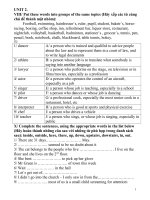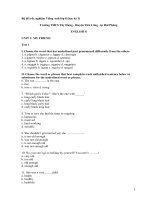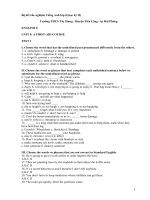Download Bài tập tiếng anh lớp 8 hay
Bạn đang xem bản rút gọn của tài liệu. Xem và tải ngay bản đầy đủ của tài liệu tại đây (94.58 KB, 4 trang )
<span class='text_page_counter'>(1)</span><div class='page_container' data-page=1>
<b>ENGLISH 4 – UNIT 4 FURTHER PRACTICE</b>
<b>I. Choose the right word in brackets to fill in the blank.</b>
1. Last night I watched the Romeo and Juliet. At last they killed ... (together/ each other/ themselves/ them)
2. ... you like to come? – I’d love to. (What/ Do/ Would/ Will)
3. Don’t go ... It’s too cold. (outside/ inside/ into/ away)
4. We must be there ...7:30 and 8:15. (at/ before/ between/ after)
5. When my grandmother was young, she used ...very well. (sing/ to sing/ singing/ sang)
6. Our team played well ...to win the gold medal. (too/ that/ so/ enough)
7. Don’t let our children ...with matches. (play/ to play/ playing/ plays)
8. How long will he ...stay there? (should/ must/ have to/ has to)
II. Complete the passage, using the correct form of the words in brackets.
It’s a (1) <i>marvelous</i> (marvel) idea for children to do some cooking at an early age. Generally (2) ...(speak),
most children can’t wait to help in the kitchen and love getting involved in the (3) ...(prepare) of their meals.
They should be (4) ...(courage) to do so. It’s important to show them how to do things (5) ...
(correct) but they should not be criticised too much. Although the finished result may not be quite to your
(6) ...(like), the young cook will undoubtedly find it quite the (7) ...(taste) food he or she has ever
eaten.
Kitchens can, of course, be (8) ...(danger) places and so the absolute (9) ...(important) of keeping
an eye on the children at all times cannot be emphasized too heavily. Sharp knives, for example, should be avoided
until children are old enough to handle them (10) ...(safe).
<b>III. Supply the correct tense or form of the verbs in brackets.</b>
1. It’s difficult...(climb) this mountain.
2. You must ...(take) an umbrella. It ...(rain) now.
3. When I was a child, I used ...(spend) hours playing with a tin box.
4. In England the sun ...(not shine) every day.
5. Do you remember the film we ...(see) last week?
6. Everyone stopped ...(laugh) when we ...(come).
7. Sandra ought ...(practice) her English more frequently.
8. Lisa is in hospital. I ...(visit) her tomorrow.
<b>IV. Fill in the blanks with the suitable prepositions.</b>
1. Peter is very proud ...his new motorbike.
2. She was very interested ...folktales.
3. I hang the picture...the clock and the calendar.
4. Putting a knife ...an electrical socket is dangerous.
5. The wardrobe is ...the right side ...the room.
6. My mother used to live ...a farm when she was young.
7. Everyone is busy ...Tet holiday.
8. You can reach her ...8 963 087.
<b>V. Make questions for the underlined words.</b>
1. Nga failed her English exam because she didn’t study hard.
...
2. Nam and Vinh are going to play tennis this weekend.
...
3. He’s downstairs.
...
4. The customer telephoned the office on June 16th<sub> just before midday</sub><sub> .</sub>
...
5. My close friend is so pretty with long black hair and a round face.
...
6. They used to live on a farm.
</div>
<span class='text_page_counter'>(2)</span><div class='page_container' data-page=2>
7. I’m going to Ha Noi by plane.
...
8. Mr. Brown has to work six days a week.
...
<b>VI. Complete the passage with the words in the box.</b>
...(1) in Scotland in 1847, Alexander Graham Bell became interested very early in methods of (2) ...
communication. He (3) ... influenced by his father and grandfather, who spent years working with
(4) ... people and those with faulty speech. Bell’s father even go so far as to (5) ... a system of
so-called “visible speech” for the deaf. He used sketches of the different (6) ... of lips and tongue. This science
of visible speech (7) ... the foundation of young Bell’s knowledge of the mechanics of human (8) ...
<b>VII. Read the dialogue, then answer the questions.</b>
Secretary: Phu My Limited Company. Good morning.
Mr. Tan: Good morning. May I speak to Mr. Quang, please?
Secretary: I’m sorry. Mr. Quang is in the meeting right now. Would you like to leave a message?
Mr. Tan: Yes, please. This is Mr. Tan ... of National Bank...
Secretary: Mr. Tan of National Bank...
Mr. Tan: Please tell him the meeting is on Monday at 9.30.
Secretary: Monday at 9.30.
Mr. Tan: And you would ask him to phone me this afternoon? My number is 9 264 187.
Secretary: 9 264 187. I’ll give Mr. Quang your message, Mr. Tan.
Mr. Tan: Thank you. Goodbye.
Secretary: Goodbye.
<b>Questions:</b>
1. Who is calling?
...
2. Where is Mr. Tan from?
...
3. Is Mr. Quang in his office? Where is he now?
...
4. Who takes the message for Mr. Quang?
...
5. What’s the content of the message?
...
6. What is Mr. Tan’s telephone number?
...
<b>VIII. Rewrite the following sentences as directed in parentheses.</b>
1. They plan to invite him for dinner tonight. (Rewrite the sentence using “be going to”)
...
2. The children like to walk in the rain. (Rewrite the sentence, using “enjoyed” instead of “liked”)
...
3. I don’t think he is strong. He can’t lift such a heavy box. (Combine into one sentence, using “enough”)
...
4. Driving too fast is dangerous. (Rewrite the sentence, using “It’s”)
...
5. He will be back on Monday. (Rewrite the sentence, using “until”)
...
6. She can’t speak. She can’t hear. (Combine into one sentence, using “neither ...nor”)
</div>
<span class='text_page_counter'>(3)</span><div class='page_container' data-page=3>
<b>ANSWER KEY</b>
<b>I. Choose the right word in brackets to fill in the blank.</b>
1. themselves 2. Would 3. outside 4. between 5. to sing 6. enough 7. play 8. have to
<b>II. Complete the passage, using the correct form of the words in brackets.</b>
1. marvelous 2. speaking 3. preparation 4. encouraged 5. correctly
6. liking 7. tasty 8. dangerous 9. importance 10. safely.
<b>III. Supply the correct tense or form of the verbs in brackets.</b>
1. to climb 2. take, is raining 3. to spend 4. doesn’t shine
5. saw 6. laughing, came 7. to practice 8. will/am going to visit
<b>IV. Fill in the blanks with the suitable prepositions.</b>
1. of 2. in 3. between 4. into 5. on, of 6. on 7. on 8. at
<b>V. Make questions for the underlined words.</b>
1. Why did Nga fail her English exam?
2. What are Nam and Vinh going to do this weekend?
3. Where’s he?
4. When did the customer telephone the office?
5. What does your close friend look like?
6. Where did they use to live?
7. How are you going to Ha Noi?
8. How many days a week does Mr. Brown have to work?
<b>VI. Complete the passage with the words in the box.</b>
1. Born 2. human 3. was 4. deaf 5. develop 6. positions 7. formed 8. speech
<b>VII. Read the dialogue, then answer the questions.</b>
Secretary: Phu My Limited Company. Good morning.
Mr. Tan: Good morning. May I speak to Mr. Quang, please?
Secretary: I’m sorry. Mr. Quang is in the meeting right now. Would you like to leave a message?
Mr. Tan: Yes, please. This is Mr. Tan ... of National Bank...
Secretary: Mr. Tan of National Bank...
Mr. Tan: Please tell him the meeting is on Monday at 9.30.
Secretary: Monday at 9.30.
Mr. Tan: And you would ask him to phone me this afternoon? My number is 9 264 187.
Secretary: 9 264 187. I’ll give Mr. Quang your message, Mr. Tan.
Mr. Tan: Thank you. Goodbye.
Secretary: Goodbye.
<b>Questions:</b>
1. Mr. Tan is calling.
2. He is from the National Bank.
3. No, he isn’t. He’s in the meeting now.
4. Mr. Quang’s secretary.
5. The content of the message is “The meeting on Monday at 9.30”.
6. 9 264 187.
<b>VIII. Rewrite the following sentences as directed in parentheses.</b>
1. They are going to invite him for dinner tonight.
2. The children enjoy walking in the rain.
</div>
<span class='text_page_counter'>(4)</span><div class='page_container' data-page=4></div>
<!--links-->









